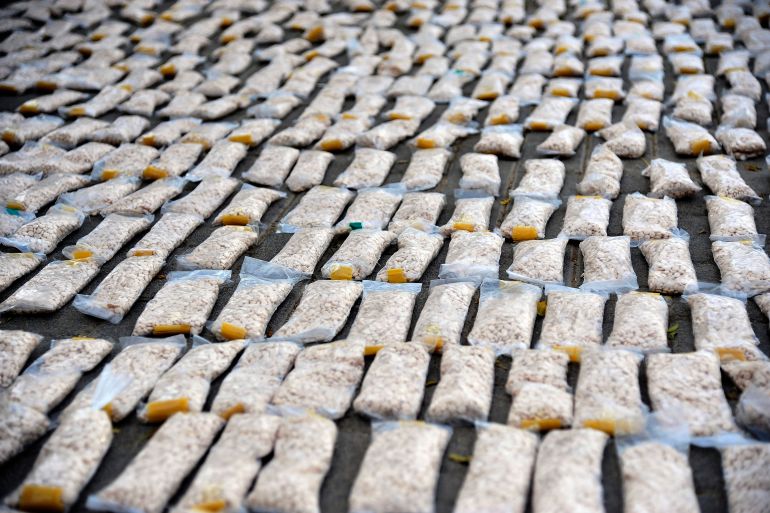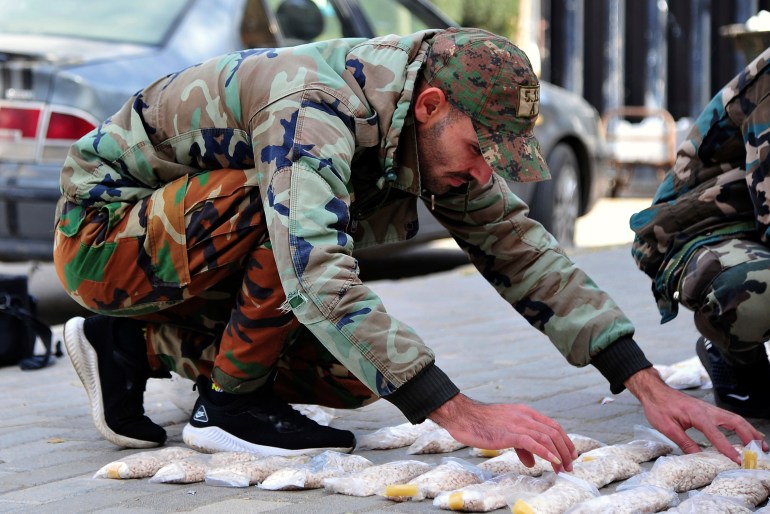How important is Captagon in al-Assad’s return to the Arab fold?
The billions of dollars that Syrian President Bashar al-Assad is believed to be making from Captagon have given him a financial lifeline.

From changing regional dynamics to a desire to put an end to a refugee crisis, a variety of factors have contributed to Syria and President Bashar al-Assad’s return to the Arab fold.
But a narcotic substance has also increasingly been at the centre of the issue. Syria is by far the world’s largest producer of Captagon, an addictive amphetamine-type stimulant pill that is being smuggled to countries across the region.
Keep reading
list of 4 itemsSyria’s Assad arrives in Saudi Arabia in first visit since war
Assad gets warm reception as Syria welcomed back into Arab League
Syrians protest al-Assad’s participation in Arab League summit
Captagon was the brand name of a psychoactive medicine produced in the 1960s in Germany that was later outlawed across the globe.
It now feeds party scenes in the Middle East but has also, for years, provided a crucial financial lifeline to al-Assad, who became increasingly isolated after events that led to civil war in Syria over a decade ago.
Al-Assad, naturally, denies any organised efforts by his government to profit from the drug, but observers say he has turned Syria into a narco-state, making billions of dollars every year from a business that is believed to be worth several times that of the entirety of operations run by the infamous cartels in Mexico.
It came as no surprise that the Syrian president did not publicly discuss the drug trade when he received a warm welcome in Saudi Arabia’s port city of Jeddah on Friday and took part in the Arab League’s 32nd summit shortly after his country’s reacceptance into the regional bloc.
But Amman said Syria has agreed to tackle drug trafficking across its borders with Jordan and Iraq following a meeting of foreign ministers earlier this month aimed at discussing the normalisation of ties with Damascus.
Days after Jordan warned it is ready to “do what it takes to counter the threat” of drug smuggling, an air raid on Syrian soil killed reputed Syrian drug kingpin Marai al-Ramthan. Jordan is widely believed to have been behind the attack, although it did not officially confirm it.
Cosmetic seizures
According to Caroline Rose, a Captagon researcher and a director at the US-based New Lines Institute, the drug business did not spark the Saudi-led normalisation efforts with Syria, but it has become a top agenda item as it represents a feasible point of collaboration.
“The Syrian regime has already conducted a number of cosmetic seizures to essentially build goodwill with a number of Arab governments. They want to be seen as a country that could interdict Captagon if they are persuaded and incentivised to, particularly with sanctions relief and economic packages,” she told Al Jazeera.

At least on the surface, Rose said she expects to see an uptick in Captagon seizures and increased coverage in Syrian state-controlled media in an effort to draw attention to Damascus’s effort to crack down on the drug trade.
“I also think that they will give up a series of traffickers that are not very closely aligned to the regime but are perceived or named as potential contributors,” she said, adding she does not believe that authorities will touch some of the alleged core backers of the trade, especially those like al-Assad cousin Wasim Badi al-Assad, who was sanctioned by the United States and the European Union last month.
“I also think the regime is very much using this as their own political card in normalisation discussions, essentially owning up to the fact that they have agency over the trade and using that as a main tactic to encourage countries to pay them off in exchange for them cracking down.”
Meanwhile, since late April alone, Saudi Arabia, the United Arab Emirates, Jordan and Iraq have announced multiple seizures consisting of tens of millions of Syrian-made Captagon pills, which are estimated to have a street value of over $1bn.
They have not, however, publicly blamed the al-Assad government following the seizures as normalisation efforts have gathered pace.
Leveraging Captagon
The only way to wean al-Assad and Syria off this illegal trade is to allow him to resume legal trade, otherwise, he will have no incentive to give up considerable revenue from Syria’s biggest export, according to Joshua Landis, director of the Center of Middle East Studies at the University of Oklahoma.
“Assad has already been leveraging the Captagon trade. It is a major reason for Jordan to decide that the status quo was not working and was unsustainable. The same is true for Saudi Arabia,” he told Al Jazeera.
Landis said that while many believed al-Assad had been “defanged” by the civil war, the sanctions, the division of the country, and the denial of access to Syria’s oil and gas, the Captagon trade shows that he is not to be ignored and can inflict harm, allowing him to demand a steeper price to curb the smuggling.
“For Assad, forgoing the drug revenue, which is Syria’s largest export, will require the restoration of legitimate trade. He will demand the lifting of sanctions and the return of his territory,” Landis said.
The US and the EU, however, have said they will refuse to normalise relations with Syria absent a fair election process in accordance with a United Nations resolution. Last week, a group of bipartisans in the US House of Representatives introduced a bill to prevent normalisation.
Meanwhile, in the region, Qatar and several other Arab nations remain opposed to reintegrating Syria without any conditions, but they elected not to block its acceptance into the Arab League.
Lina Khatib, director of SOAS Middle East Institute, sees Syria’s return to the Arab League after a 12-year hiatus as a win for al-Assad with no strings attached, at least for the moment.
“Arab states have little leverage over Assad because they have other domestic and regional priorities to tackle and divert resources to, from economic growth to stability in their immediate neighbourhoods.
“They also cannot rely on US backing vis-à-vis Assad as the US has been generally disengaged from the Syrian conflict,” she said.
Khatib believes al-Assad is unlikely to give up Captagon.
“The most Arab countries can hope for in this regard,” she said, “is that those regime elements involved in the Captagon trade might divert some of it to markets outside the Arab world so as to reduce the flow of the drug to Arab countries.”